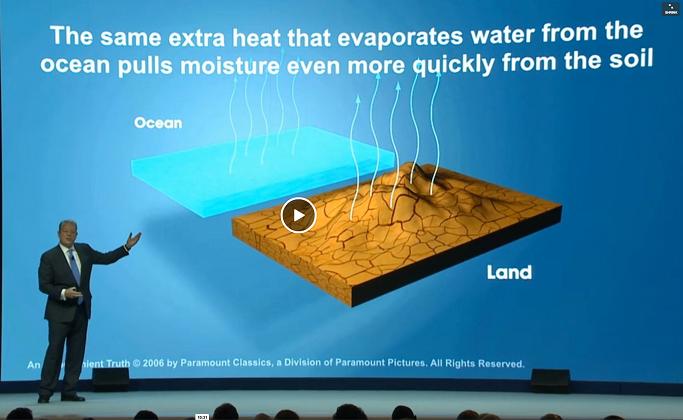
Click image to see presentation.
Al Gore made a moving presentation at the world economic forum, showing many examples of how climate change is already reaping havoc on the world population. Floods, storms, landslides, displacing millions of people in the recent, hottest years on record.
Why is economics unable to deal with climate change?
Economics is a based on concepts of investment and return. Yet today what we ‘invest’ is fiat money, it is worthless paper and nothing is done in the market to prepare it for the emergence of new money. So how can this work? Because the market offers fossil fuels, which can be used in motors and chemical processes to directly produce goods and facilitate services. It can be used to mine, to refine, to transport. The only thing required is the ability of the parties involve to purchase it, and the only thing needed for that is 1. availability and 2. money. It is easy to see that money creation follows the availability of fossil fuels, and not the other way around. This is the carbon credit economy.
In an economy that is not led by the availability of fossil fuels, but one that is restricted to using only renewables the rules are different. This is because when money is created it is not matched by instant new production capacity as long as fossil fuels are available. If money is created in a renewables based economy one has to hope that that money can 1. buy stored renewable energy 2. can purchase available renewable energy capacity. Both will have extremely low cost so will have been used already. Money in this situation is nothing if it comes without guarantees that renewable energy can be bought with it. Once again energy is leading, but now it is leading in a much less flexible way, simply because stored renewable energy is not lying around to be sold by banks against their new credit.
Because of these differences between a carboncredit (CC) economy and the renewable credit economy a transition from one to the other is impossible. If carbon credit and renewable credit are mixed in economic traffic the prices will be determined by the fossil fuel market, and those prices are either arbitrary if oil/coal/gas is abundant, and hyperinfaltionary if they aren’t.
The key to the renewable credit (RC) economy is to understand that production, the existence of goods to be traded, justifies the existence of credit, and thus the energy producer has to create the credit, not the bank. In the carbon credit system the banks have put themselves in the middle by many tricks and lies and by the use of brute force. In the renewable credit system the energy producer must create the credit to buy its energy, so that the credit disappears when the energy is bought. This can be a local or national currency system but the wider the area covered the higher the losses. A key breakthrough would be the invention of energy storage systems as efficient as coal and oil, because that could recreate an economic system as we have today. Until then money in the RC economy is local, the amount of credit is restricted to energy production.
Economic growth in the CC is nothing more than the expansion of the use of fossil fuels. The more fossil fuels are used, the more credit will flow, the richter the banks get and the more the producers of fossil fuel can enjoy (they ask a price that manages demand by managing the amount of cash in circulation, in tandem with the banks). Economic growth is not robust, it collapses when the fuel supply collapses, it is something we should not even strive for, but we have to in order to serve the banks and ff companies in the CC economy. Thus the CC economy is the ecological diseaster it is.
The RC econonomy has to start small in parallel in many places, and exclude the CC economy. This is very hard because the CC economy has more power and is well trained in shaking up local economic systems so they have to go into debt and become part of the global economy. The way to implement is is for government to look at new renewable energy sources, determine their contribution to the local economy and creating credit for the owner abd themselves (a tax) to use. Economists will not suggest this approach. The target at the World Economic Forum in 2014 was 100 trillion more debt to own the rest of the world. It is evident that the World economic forum is not the place to talk about climate change. It could be the place to talk about RC economics and how to allow it to take over.